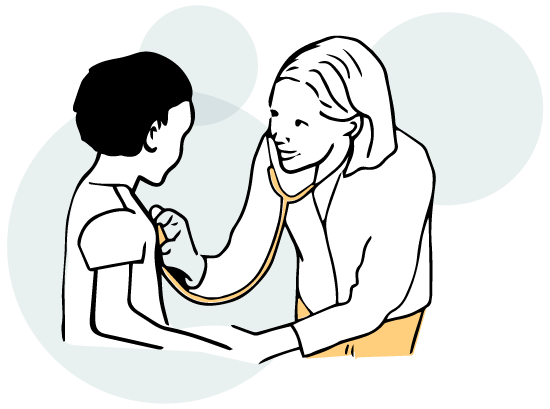


Coarse facial features2

Umbilical and
inguinal hernias2

Skeletal and joint problems (dysostosis multiplex)2

Recurrent otitis
media1

Hepatosplenomegaly2

Carpal tunnel
syndrome2

Enlarged tongue,
tonsils, and adenoids3

Many of the signs and symptoms of Hunter syndrome overlap with common childhood complaints, but clinical suspicion can be triggered by particular symptom clusters that are unlikely to appear in an unaffected child.1 As it is often the pediatrician who recognizes an underlying problem connecting the seemingly unrelated signs and symptoms that a patient has, increased awareness of MPS II is a critical factor in early diagnosis and referral.1
A newborn infant who has Hunter syndrome may appear unaffected in the first months and years of life, but between the ages of 2 and 4, physical abnormalities begin to emerge and, in some cases, cognitive impairment may develop.2

Respiratory problems, including noisy breathing
and snoring1

Chronic
rhinorrhea1

Recurrent watery
diarrhea1

Developmental delay and/or speech delay1*
*Neuropathic type only
Management
After a confirmed diagnosis of MPS II, the pediatrician has a key role to play in the multidisciplinary management of the patient.1 Patients and caregivers are often overwhelmed with the number of different pediatric specialists that are involved in their care to manage their specific symptoms.1 The pediatrician can help facilitate care among these many specialists and provide a consistent medical home for the patient.1
1. Burton BK, Giugliani R. Eur J Pediatr. 2012;171(4):631-639. 2. Martin R et al. Pediatrics. 2008;121(2):e377-e386. 3. Muenzer J et al. Pediatrics. 2009;124(6):e1228-e1239. 4. Wraith JE et al. Genet Med. 2008;10(7):508-516. 5. Mendelsohn NJ et al. Genet Med. 2010;12(12):816-822. 6. Keilmann A et al. Inherit Metab Dis. 2012;35(2):343-353.
Hunter syndrome is a
progressive genetic disease
If you suspect Hunter syndrome, refer your patient to a metabolic geneticist for an accurate diagnosis.